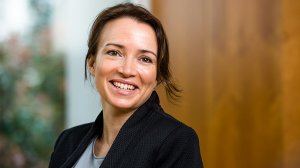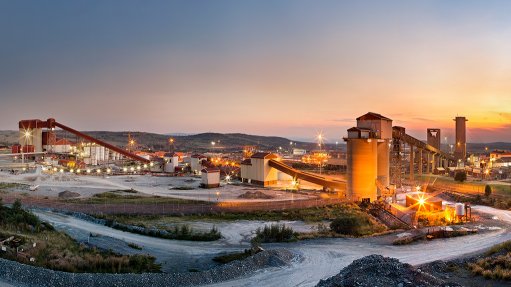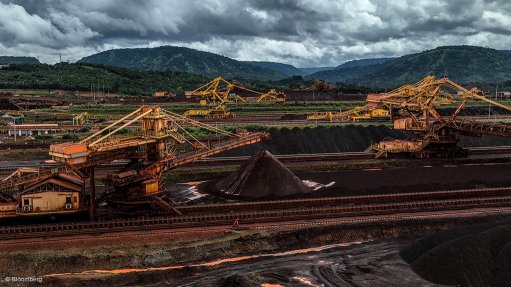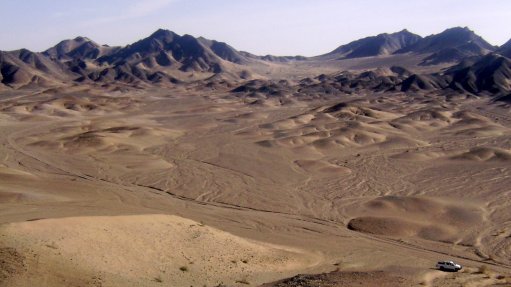ESG business critical, not just the right thing to do

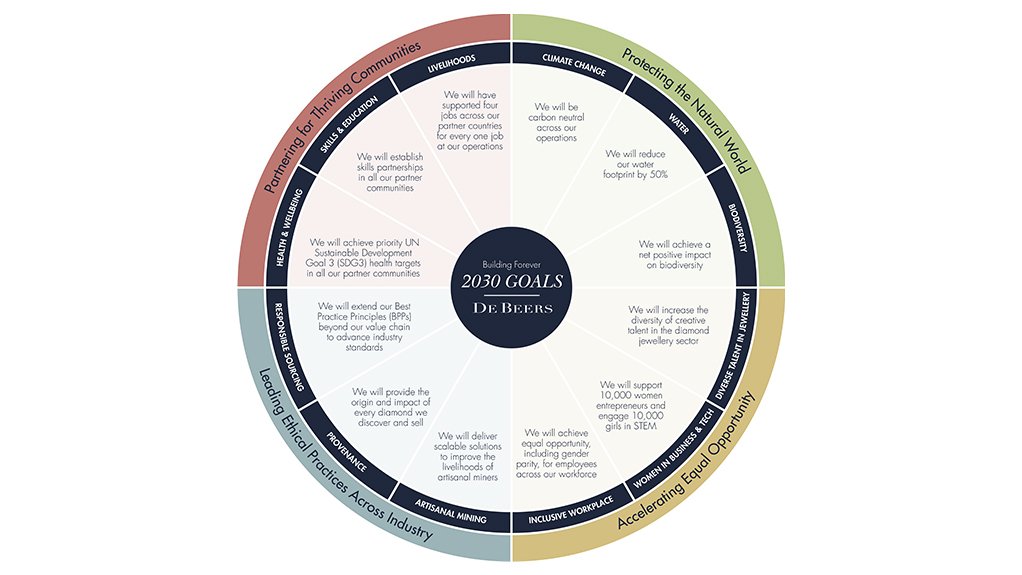
Engineering News & Mining Weekly speaking to Katie Fergusson, the senior VP sustainable impact of De Beers Group
BUILDING FOREVER The outline of De Beers Building Forever 2030 thrust, showing the four pillars and the 12 goals
De Beers Group, the world’s largest diamond company by value, is working to leave a positive long-lasting legacy beyond mining.
To achieve this, it has set 12 Building Forever 2030 Goals, three for each of the four supporting pillars.
Climate change, water and biodiversity goals are the sum and substance of the ‘protecting the natural world’ pillar; livelihoods, skills and health goals are the imperatives of the ‘partnering for thriving communities’ pillar; artisanal mining, provenance and responsible sourcing are upheld by the ‘leading ethical practices across industry’ pillar; and an inclusive workplace, women in business and tech, and diverse talent in jewellery are the nubs of the ‘accelerating equal opportunity’ pillar.
Since launching the 12 goals in November, early success factors being seen in each pillar have been exemplified by:
- the significant acceleration of the advancement of women across De Beers Group, coupled with the promotion of their furtherance into leadership and technical positions.
- the commitment of an additional $3-million earlier this year to support women entrepreneurs in Southern Africa, in partnership with United Nations (UN) Women. This has provided tailored business training and mentorship to more than 1 000 women entrepreneurs in Botswana, Namibia and South Africa to date, as well as qualifying 50-plus local trainers to ensure its sustainable future. As part of its Building Forever goals, De Beers Group has committed itself to supporting 10 000 women micro-entrepreneurs by 2030.
- the advancement of a reduce, recover and replace strategy to achieve carbon neutrality by 2030 across all our operations, from mining through to retail, which has been described as “a really big bold goal”.
- identifying large-scale job creation opportunities at multiple skills levels in agriculture and agroprocessing at, for example, the Venetia diamond mine, in Limpopo, where work is ongoing with the Lima Rural Development Foundation to generate a further 3 000 employment opportunities beyond the 500 already created, as well as advance a skills-for-the-future programme that matches internships to the demands of the local industry.
As part of an in-depth interview on the company’s strategy to meet environmental, corporate and social governance (ESG) demands that are currently top-of-mind globally, Mining Weekly put these questions to De Beers Group sustainable impact senior VP Katie Fergusson:
Firstly, what does the expression ‘Building Forever’ entail and why is it so important to De Beers Group?
Fergusson: Building Forever is our approach to sustainability. We want to create a real step change and light a fire under the business to accelerate progress, and our focus on protecting the natural world through decarbonisation is a good example of how we will work collaboratively across the entire business to achieve our ambitious goals. Sustainability has always been important to the host countries and communities where De Beers operates, and we really feel that we have a unique responsibility and opportunity to work with partners in host countries to create a long-term positive impact. ESG is also increasingly important to our employees. We hear about it more at interviews and it’s increasingly important to our clients and our consumers, right across our value chain. This is something that is really business critical and not just the right thing to do.
How do you go about implementing a sustainability framework of this scale across a global business such as De Beers?
De Beers is very diverse, from mining right to retail, so the first thing we did was to develop a framework and set goals that could provide a ‘North Star’ for the group while being flexible enough for each part of the business to make it relevant to what these sections were doing in their own local context. It was really important to get buy-in and commitment from every part of the business. The second thing was making sure that we have the right technical expertise and processes in place to embed this into operational and business planning. For each one of the 12 goals, we have a technical expert that develops the baselines, roadmaps, technical oversight and guidance. Each part of the business needs to develop a five-year plan and those are all being worked. Some are complete, some are still in development, and will show how they are going to implement these goals and contribute to the overall group targets. Simultaneously, we need to make sure that, as a culture, sustainability is absolutely embedded into decision-making. Some of the things we’re doing are working with our employee engagement team on a campaign using podcasts, town halls, newsletters, value shares, to get this out to all our employees, wherever they are in the business, as well as working with human resources on how this can be built into every job description. There is now a sustainability module in every one of our leadership development programmes to ensure that it is embedded at every level of the business and taken into account in the way that people are rewarded and incentivised, and ensure that it is in every decision-making process.
You’ve given yourself ten years to achieve these goals. What early success factors are you seeing in each pillar?
I can share some things that we’ve done over the last few months and I’ll choose a few examples from across the pillars. On our carbon-neutral work we have been working very closely with partners such as the Carbon Trust to develop a strategy of reduce, replace, recover. On reduce, we are focused on new technologies, through the Anglo American FutureSmart Mining programme, to maximise efficiencies at the mine and reduce energy use through those innovative technologies. On replace, we’re looking at how we move away from fossil fuels in terms of the trucks moving to green hydrogen and renewables generation and storage. We need to look at how we build that and how we take advantage of the great solar and wind we have across Southern Africa to build those partners and those solutions. We need to look at who else those solutions could benefit. On recover, for the small percentage of remaining emissions that we can’t eliminate through reduce and replace, we’re looking at different innovations, one being using the kimberlite in the waste around the mines, which is a natural absorber of carbon dioxide, and how we can accelerate that natural process. Also, we have 200 000 ha of conservation properties across Southern Africa that are actively managed to protect and enhance biodiversity. We are working with partners, such as Fauna & Flora International, to enhance carbon capture and storage. On our ‘accelerating equal opportunity’ pillar, which is one I’m really passionate about, we have another five-year partnership with UN Women.
We saw the achievement during the first three years of our partnership. We went from no women on our executive committee to 46% of our executive committee being women. We went from 17% of our leadership across the business being women to 30%, and 33% in our managed operations. That’s considerable acceleration and it shows what can be done when the whole business sets its mind to something. We’re now focused on how we build a pipeline of women in technical roles and who we support from school to graduate level and into that technical pipeline. In our ‘partnering for thriving communities’ pillar, our Venetia mine has announced two big programmes in our ‘livelihoods and skills’ goal space. In livelihoods, we’re seeing an opportunity in the agricultural and agroprocessing space for large-scale job creation at multiple skills levels. We’re working with the Lima Rural Development Foundation at Venetia. In the pilot phase, they supported 500 small-scale farmers by providing technical assistance, access to market and new value chains. We’re expanding that for another five years and we’re aiming to support a further 3 000 jobs around Venetia.
Our ‘skills for the future’ programme involves working with the International Youth Foundation, the Department of Higher Education and Training, and industry in Limpopo, including many for our large contractors at the mine, on another three-year expansion of a programme, which aims to understand not just the skills that industry needs for today, but also in five, ten and 15 years’ time. It supports technical and vocational education and training colleges in curriculum updating, lecturer capacity building, and life skills incorporation, so that the skills of graduates emerging from those colleges for internships match the demands of industry in the area.
How are you going to track progress against your goals?
Each part of the business is developing a five-year plan and the implementation of those plans is being tracked through the business scorecard. That is at executive committee level and has high visibility. Then, for each of the goals, baselines and roadmaps are being developed with 2030 targets. We will have a target of what every goal needs to have achieved by the end of every year to meet that 2030 goal. Through our sustainability reporting, we will publicly disclose that. Where we have successes, we will share the models, and when we have learnings, where things don’t work, it’s equally important to share those as well. We also need to share the stories of the people doing the work, the stories of the people impacted on by the work of our partners. An important part of our role of effecting a broader change around sustainability needs to be a combination of data and inspirational stories and being open about the learnings, and we aim to do all three.
How has Covid-19 impacted on your overall response to ESG issues?
ESG has been important to De Beers for a very long time but I think there are a few new things with the pandemic. Firstly, once we realised the scale and the potential implications of the pandemic, the entire business was focused on prioritising support for our employees, to keep them safe and healthy, and for our host countries and communities. Over the last 15 months, we have contributed more than $17-million in financial donations and income support, along with our joint ventures.We’ve looked at the prevention phase, donating hygiene and medical supplies and supporting educational campaigns around public health, working with public health authorities, and supporting better access to water and sanitation in some communities. In the response phase, we’ve been engaged in polymerase chain reaction testing, providing intensive care unit beds and ventilators, supplying food parcels to vulnerable groups, and working with UN Women to support organisations in the communities around our operations who are supporting survivors of gender-based violence. In the recovery phase, we are focused on supporting vaccine procurement and using facilities as part of the roll-out while supporting small businesses and helping them to be resilient through this recovery phase.
That links to another ESG impact, as many of our programmes were quite dependent on face-to-face coaching, business training and education. Initially, while we were very focused on the Covid response, we were also concerned that some of our programmes were stalled because we couldn’t hold face-to-face workshops and our partners couldn’t get out to run the programmes. But the silver lining is when we asked our partners what we could do to still provide support, many programmes trialled different virtual solutions and many of them will remain after the pandemic. There have been some real successes, which probably we wouldn’t have learned if we had not been forced to.
Then, what we’ve all seen through the pandemic, is everybody globally has time to reflect on the importance and interconnectedness of all these issues on health, environment, social inequality and financial resilience. Sustainability has moved from something that was probably still sitting largely with the sustainability teams to being embedded into strategy and innovation, into how we recruit and develop our employees, how we engage with our employees and stakeholders, how we partner, into our brand and marketing. It has really accelerated to the absolute core of the business and everybody across the business realising that this is part of their role – and that’s really exciting.
The Overall Ambition
“We are committed to supporting a lasting positive impact that will endure well beyond the discovery of our last diamond, and it is only by pushing ourselves to do more that we can maximise long-term benefits,” De Beers Group CEO Bruce Cleaver stated in a release to Mining Weekly.
The De Beers group laudably aims by 2030 to:
• achieve gender parity throughout its workforce;
• advance the standards of the diamond industry;
• provide the origin and impact of every diamond it discovers and sells. Besides CarbonVault, the group also has the blockchain-based Tracr trade-marked platform;
• deliver scalable solutions to improve the livelihoods of artisanal mineworkers;
• achieve priority UN Sustainable Development Goal health targets in all its partner communities;
•
establish skills partnerships in all its partner communities;
• support four jobs for every one job at its operations;
• halve waste and water footprints;
•
achieve net positive biodiversity impact; and
•
increase the diversity of the creative talent in the diamond jewellery sector.
All this will be done by continuing to work alongside key organisations that provide expertise and guidance, including Fauna & Flora International, Peace Parks Foundation, UN Women, WomEng, Stanford Graduate School of Business and government partners.
Comments
Press Office
Announcements
What's On
Subscribe to improve your user experience...
Option 1 (equivalent of R125 a month):
Receive a weekly copy of Creamer Media's Engineering News & Mining Weekly magazine
(print copy for those in South Africa and e-magazine for those outside of South Africa)
Receive daily email newsletters
Access to full search results
Access archive of magazine back copies
Access to Projects in Progress
Access to ONE Research Report of your choice in PDF format
Option 2 (equivalent of R375 a month):
All benefits from Option 1
PLUS
Access to Creamer Media's Research Channel Africa for ALL Research Reports, in PDF format, on various industrial and mining sectors
including Electricity; Water; Energy Transition; Hydrogen; Roads, Rail and Ports; Coal; Gold; Platinum; Battery Metals; etc.
Already a subscriber?
Forgotten your password?
Receive weekly copy of Creamer Media's Engineering News & Mining Weekly magazine (print copy for those in South Africa and e-magazine for those outside of South Africa)
➕
Recieve daily email newsletters
➕
Access to full search results
➕
Access archive of magazine back copies
➕
Access to Projects in Progress
➕
Access to ONE Research Report of your choice in PDF format
RESEARCH CHANNEL AFRICA
R4500 (equivalent of R375 a month)
SUBSCRIBEAll benefits from Option 1
➕
Access to Creamer Media's Research Channel Africa for ALL Research Reports on various industrial and mining sectors, in PDF format, including on:
Electricity
➕
Water
➕
Energy Transition
➕
Hydrogen
➕
Roads, Rail and Ports
➕
Coal
➕
Gold
➕
Platinum
➕
Battery Metals
➕
etc.
Receive all benefits from Option 1 or Option 2 delivered to numerous people at your company
➕
Multiple User names and Passwords for simultaneous log-ins
➕
Intranet integration access to all in your organisation


